First Back Plate Removal
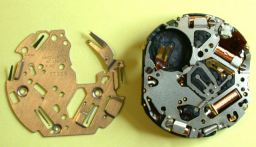 |
This picture
shows the first of two stainless steel back
plates which must be removed to get to the
mechanism. These plates serve to shield the
electronics, carry gear bearings/pivots, and
act as return springs for the pushers. They
are very accurate precision stampings.
|
| |
|
Second Back Plate
Removal
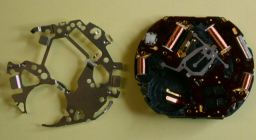 |
The second
backplate, when removed exposes the flexible
printed circuit board. |
| |
|
Flexible Printed Circuit
Board
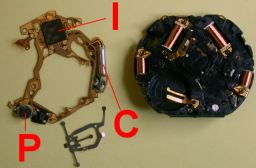 |
The flexible
printed circuit board is the "control
center" for the entire watch. It consists of the
Control Integrated Circuit "I", the 32,767 hZ
crystal "C" and alarm
transducer circuitry "P".
This P.C.B. is
similar to that found in cameras and other
electronic instruments. All of the
interconnects are pressure type Gold to Gold
so no soldering is required.
|
| |
|
Gears at Last !
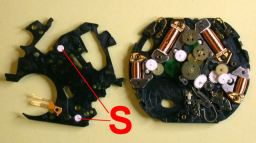 |
After the
circuit board is removed the back plate is
the next item to come off. Two more white
nylon cams "S" are turned to
remove the back plate revealing the geartrain
and stepper motors. |
| |
|
Gears and Motors
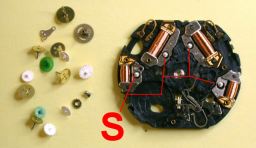 |
With the back
plate off the geartrain can be removed.
The geartrain consists of:
7 - Brass and Nickel gears.
2 - Hard plastic gears (Green)
5 - White Nylon gears.This watch has 4
stepper motors "S" !
The motors consist of an armature (white dots
that the call out points to) and a coil for
each motor.
|
| |
|
Closeup of Motors
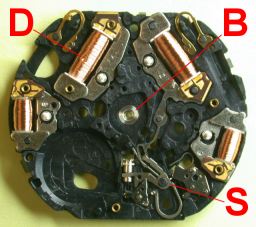 |
The closeup
in this picture shows the steel bushing
"B" for the main
watch hands, a somewhat complex looking
spring "S" which operates
the setting mechanism for the crown, and,
finally the damaged part, a dent in the coil
"D" which must have
been causing the intermittant opertaion. |
| |
|
Conclusion
Far from being a blob of plastic with a
battery and motor, quartz watches are quite
impressive when you consider the number of
technologies involved in their production.
Everything from precision diecasting to
miniature motors to standard screw machine
fabrication is involved.You won't find any
"Old World Craftsmanship" here,
just modern manufacturing of the type that
made Japanese cars and cameras some of the
best in the world.
|

